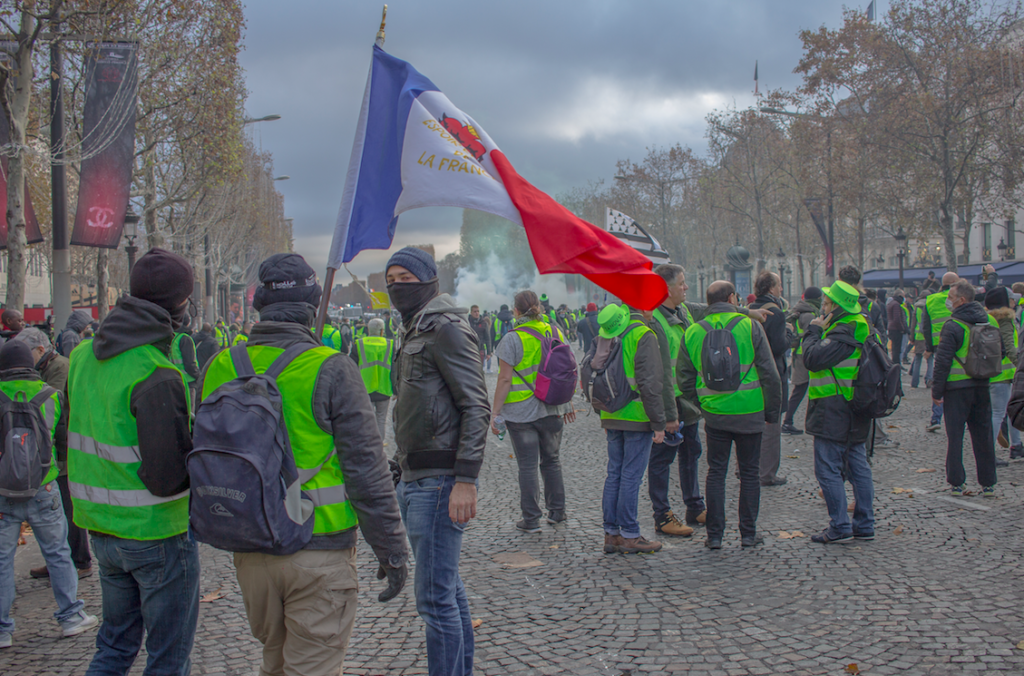Has a new revolution started in France? A proposed new green tax has fueled peaceful protests, called the Yellow Vest Movement. Over the weekend riots erupted in Paris, perpetrated by ultras who have infiltrated the yellow vests.
Has a new revolution started in France? According to the torched cars and blocked roads on TV, it would be easy to believe that the war zone has moved from Syria to Paris. Vandalized shops, barricades, and—as FOX News put it—“Angry French protesters turn violent.” In my opinion, Monday’s Washington Times headline has a better grasp on the situation: “Yellow jackets protest erupts into riots in Paris.”
What is the Yellow Vest movement?
It started with a tax raise. From October 2017 to October 2018, the price of diesel has jumped by 23% (Source: Le Point). People who depend on their cars to get around perceived the announcement of the green tax on fuel as an additional burden.
On Saturday, November 17, some 300,000 people gathered in the French provinces and protested against the rising fuel prices and high cost of living. Symbolically, the protesters were wearing a safety vest that French motorists are required by law to keep in their car.
Widely available and inexpensive, the yellow vests are highly reflective and meant to attract attention.
Three weeks later, the Yellow Vest movement represents a wider wave of resistance against the government economic reforms. (More on this later.)
Why do 72% of the French support the Yellow Vest movement?
French people believe that they are entitled to fill the street and let off steam against unpopular government actions.
This idea has a long history. French philosopher Rousseau argued in The Social Contract (1762) that “freedom and authority are not contradictory, since legitimate laws are founded on the general will of the citizens.” He also differentiated between legal and legitimate acts, as “the only legitimacy belongs to the people, not to elected representatives.”
French citizens take this to heart and exercise their right to march in the streets to protest against everything. Personally, I marched for the first time at age 15 or 16. As I recall, it had to do with crowded classes (at times there were 36 of us students in the classroom) and the lack of teachers.
According to a Harris Interactive poll from December 2, 72% of the French support the Yellow Vest movement. Their support is steady since no changes have been observed since the first poll on the subject, conducted just after November 17.
As Forbes stated in this March 2018 article, “demonstrating is a national pastime.”
Interestingly, we also use the word “demonstration“ in French but with another meaning. It’s about proving something with evidence and arguments. What the French do when they take to the streets is called in French a “manifestation” in the sense of showing something—in this case, a general feeling of disappointment or anger.
However, demonstrations in France are peaceful movements, often family events.
Demonstrations reflect the French passion for debate.
Conflict and confrontation are part of the French culture. Heated discussions at the dinner table with family or friends are the norm and cover many topics, from the news to politics, sex, and religion.
While Americans are looking for agreement, the French search for confrontation. They don’t expect their listeners to make a change, but they are happy to engage in discussions and exchange ideas, both pros and cons.
For the French, arguing is not fighting. In fact, debating someone is almost an honor. Unfortunately, many French are not too skilled in English, so if you don’t speak French, you won’t have the opportunity to debate them.
Yes, debating and taking to the streets are entirely part of the French culture.
Who are the Yellow Vest protesters?
The media outlets are repeatedly showing scenes from Paris. However the Yellow Vest protesters are more likely active in small urban or rural areas where people need their cars to go to work, grab groceries, etc.
Vincent Tiberj, professor at the prestigious academic institution Sciences Po, describes the Yellow Vest activists as “The Forgotten: They work, pay taxes, earning too much to qualify for the social welfare and not enough to live comfortably.”
They are unorganized, have no leader, and are not associated with a specific political party. Social media spread the news, but protesters come from the middle class, representing also workers and pensioners. My late parents could have been part of them. I’ve also noticed that my older relatives sympathize with the movement.
The first demonstrations were marked by many blocked roads and closed highway toll booths but essentially no violence.
So who are the hooligans torching cars and vandalizing shops?
While the French support the Yellow Vest movement, 85% disagree with the riots that erupted over the weekend in Paris. In that time, Paris police arrested 380 people. Since the beginning of the protests three weeks ago, four people have now died.
That being said, violent protesters don’t represent the Yellow Vest movement. In Paris, hooligans looted shops, vandalized buildings, and even attacked the police.
As The Economist reported, “The profile of the perpetrators is mixed. Some were organized ultra-right and ultra-left troublemakers, who are known to police for infiltrating protests. But there was a blurring of the lines between the organized and mobile groups of anarchists and neo-fascists, and some of the otherwise peaceful gilets jaunes.“ (Gilets jaunes = French for yellow vests)
How will it end?
That’s a good question…
Since the demonstrations started three weeks ago, the number of protesters has dropped from 282,000 on November 17 to 136,000 this weekend. At the same time, violence has intensified. Another day of protests is planned for December 8. Fewer people could show up then, disapproving of the violence.
Of course, the protests may fade only temporarily. The French have put a lot of hope in President Macron, a young politician who disrupted the political scene two years ago. Today, many are disappointed and feel as if he has let them down with policies helping only the rich. As a group, the protesters have little in common other than being angry with the president.
When I started writing this post, I wanted to point out that former governments have always rolled back unpopular decisions. I thought that if Macron backed down on the green tax, he wouldn’t be able to push his agenda of reforming the country. Considering his handling of other union-led protests, I doubted that he would “cave to the street.”
The news showed me otherwise. On Tuesday, Prime Minister Edouard Philippe announced the postponing of the green tax.
Will it be enough?
In a country where confrontation and demonstration are normal, it’s just a question of time until new protests erupt.
Photo copyright: NightFlightToVenus in Flickr Creative Common






Why is it the yellow vests are no longer reported on the news in England?
(Commentaire paru d‘abord sur LinkedIn)
Je crois Catherine, que hormis la nature économique et sociale des revendications du mouvement des gilets jaunes et aussi du désir de montrer que la population a le droit de manifester (liberté, égalité, fraternité), il ya aussi un élément que tu n’as pas abordé relativement à la perception du mouvement que le pouvoir agit “en arrogants”. Ce terme a été souvent utilisé de la bouche même des gilets jaunes. Ils ne se sentent pas entendus, ni écouté, ni considérés. Il ya une perception par le mouvement que “les autorités sont déconnectées de la réalité”. Cet élément de perception de “miscommunication “ et “misunderstanding” a été crucial dans l’escalade de la crise. Comme on dit dans le domaine des comms: “perception needs to be managed as reality”. Finalement, c’est sous la pression et le “manque d’écoute perçu” que les concessions vont se réaliser …” A real life case study of crisis management …
A carbon tax seems not to be a purely French issue. It is one of the favorite Canadian political buzzwords, similar to “healthcare” in the States.
While it may seem to be hard on “small people”, a carbon tax isn’t all bad and currently our best bet to fight climate change. The majority of carbon emissions (at least in Canada) are produced by big companies and their factories. A carbon tax would make renewable sources of energy more attractive and consequently accessible. Climate change is a real issue and we need to reduce our carbon footprint quickly.
I have been so worried about France after following the nearby discontent and protest in Britain over the Brexit debacle. “What is happening over there? Is there no peace in the world?” I have wondered. Thank goodness you put the Yellow Vest protests in perspective for me! You even made your blog funny by pointing out that your readers will not be able to enthusiastically engage in the socially acceptable behavior of arguing if we do not speak French!” Whew! I am glad the French are simply doing what French people do when they are unhappy.
There is so much going on in France. Many people are just disappointed because they thought a new leader would solve all problems. But France needs to be reformed in order to get better. I believe that it could get harder now for Macron to do his job and to reform even more than he did until now.
A tax on fuel has more impact on « small » people who live outside of fancy city neighborhoods than on wealthy citizens. It was a mistake to announce this green tax now.